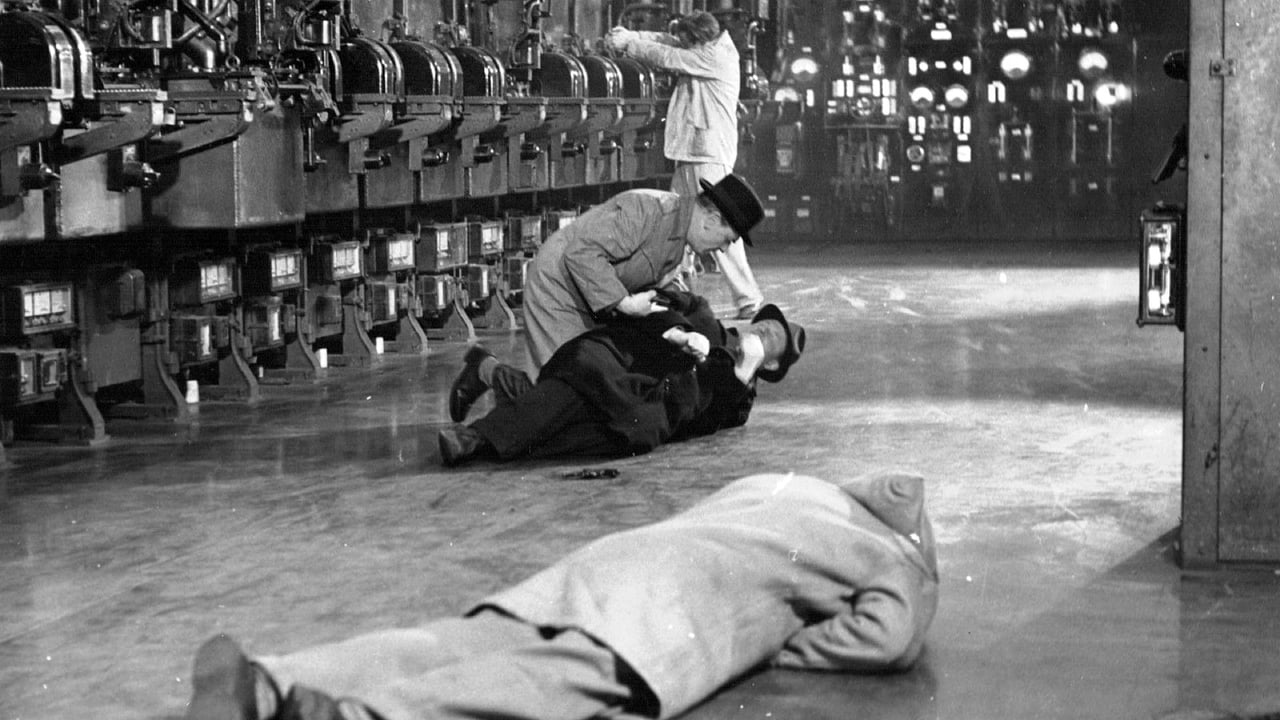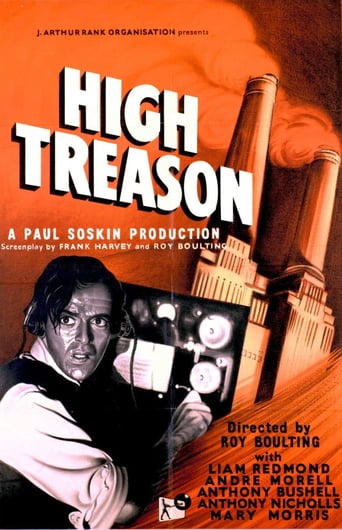

'High Treason' was the second of an unofficial trio of cold war dramas directed by Roy Boulting, beginning with 'Seven Days to Noon' in 1950 and ending with 'Suspect' in 1960. For the few people that have ever heard of it, 'High Treason' comes as an embarrassment undoing all the good that Roy and his brother John had done the year before with the Oscar-winning 'Seven Days to Noon' which stands up impeccably to modern political sensibilities after nearly seventy years; while 'High Treason' seems to belong more with Hollywood exercises in Red-baiting paranoia like 'The Iron Curtain' and 'I Was a Communist for the FBI'.As filmmaking, however, it's well up to the standards of the Boultings' other films of the period, immaculately shot on location by Gilbert Taylor (and giving pride of place in a slam-bang climax to my favourite London landmark, Battersea power station), wittily scripted and flavourfully acted by an enormous cast of familiar British faces (including Andre Morell returning as Supt. Folland from 'Seven Days to Noon'). Just as ten years earlier wartime British films had exaggerated the extent of activity by wartime British fifth columnists, so the organised sabotage depicted here is rather fanciful. But the Portland spy case ten years later proved 'High Treason's depiction of spies in suburbia was spot on, while the defection of Burgess & Maclean the year the film was made would eventually blow the lid off just how high within the British establishment the Kremlin's influence had reached - as this film insinuates in the unctuous form of the urbanely treacherous Grant Mansfield. At that very moment a joint British & American operation to incite a popular revolt against the Communist regime of Enver Hoxha in Albania was meeting with failure after catastrophic failure costing the lives of over 300 agents because operational matters had been placed in the urbanely treacherous hands of Kim Philby.
... View MoreHigh Treason is a bit less paranoid than some of those anti-Communist thrillers coming out of America at this time. But it does take the same kind of strident tone.Liam Redmond of the Royal Navy and Andre Morrell of Scotland Yard latch onto a tip that something the Reds might be planning is really big. A whole lot of troop movements are noted behind the Iron Curtain. Could it be the big invasion? If so, what's planned for Great Britain?It's big all right, a well coordinated plan of sabotage in several locations including the giant Battersea Power Works just outside of London. This is to leave the British vulnerable to invasion so they can neither aid the continent or protect themselves.Heading all of this and prepared to be the Communist Quisling is MP Anthony Nicholls, an Independent elected on the People's Progress Party. When you see that you know its Communist. For the people who were dealing with Klaus Fuchs and McLean and Burgess the subversive threat was real enough. Of course I doubt Stalin was ready for this kind of action. The proof is he never attempted anything like what is depicted here.The cast performs well. Nicholls's part is the most interesting. You wonder who in our Congress might have been viewed as the equivalent.
... View MoreI agree with the writer of the previous comments. This is a little gem of a thriller, not because it has unusual plot twists, or even especially good acting, but because of its fantastic pacing (more like a modern thriller than the usual fare from 1951), and because of its fabulous shot-on-location scenes that put you right in post-war London. I grew up in post- war Britain, so perhaps I'm biased; but some of my favourite films are those which manage to escape the confines of the studio, something that was much rarer in those days than it is now. The world of the film is now more than half a century distant, and when you watch those streets, buses, and cars, those people walking around, it's slightly shocking to realize that many of them now sleep the big sleep, that you're looking through a window into the past. This alone, for me, is worth the price of admission.The film is also the least talked about, most neglected of all Boulting's films, and as far as I can make out, hasn't ever been released on VHS, let alone on DVD, probably because, once the 1960s New Left had come into the ascendancy, especially in the various film studies institutes, the kind of old fashioned Cold War politics Boulting's film embodies were seen as both embarrassing and naive. Well, it's time for a re-evaluation. The politics of the film never did make much sense, so what we're left with is an exciting, well-crafted, and beautifully paced thriller, one that has, perhaps surprisingly, more heft than many contemporary thrillers, certainly more pizazz than the usual James Bond entries. If you can see it (and I discovered it courtesy of A&E, who ran it as a kind of joke several times in the early 1980s) sit back and enjoy it.
... View MoreThis movie would be worthy of further research - but it's popped up at 4 in the morning during an insomnia bout and it'll have to wait.... for instance, the term Communist is never used, though the plot is quote clear by implication. The foreign agent is Russian, the newspapers run headlines about military buildups in 'the East' and the saboteurs are a mix of 'militant' dockers, effete 'intellectuals' who smoke pipes, run contemporary art galleries and go to string trio recitals of work by Berg. There are of course the hapless naives enmeshed by ruthless political manipulators and terrorists - they use that word - who at the last moment realise their errors and raise the alarm in time to save the entire electricity generating capacity of the UK!I was surprised at how early on in the Cold War this film appeared as it would have been scripted/made in the year that Sen McCarthy came into prominence in the US - could it have been one of the factors that set him and the rest wolf pack on the hunt? It was actually made by one of the Boulting brothers, better known for their later comedies, though Roy made a reputation with propaganda/morale boosting titles in the 40s, so no surprise he sounded the alarums across the Iron Curtain in this title. Following more in the British tradition of that time of 'dramatised documentary', it has some remarkable scenes of seedy, filthy post-War London, using an Irish lead character to soften the obvious class divisions rampant throughout the plot, an irony no doubt, not lost on the co-writer, Frank Harvey, who also played one of the Scotland Yard team who had the shoot-out with the class enemies at the thriller's end. Frank was to die later in Sydney, Australia - which is where I saw the film, in the wee small hours. Maybe Frank is where Australia's 'hunt for Reds' came from in the 50s too..... or maybe I'm just being too naive, like this movie..... It's a great example of the way in which popular cinema can insinuate that socially and culturally specific groups can be a danger to an imagined national security by heightening the sense of 'the other' (and unknown), breeding distrust and suspicion, enabling those in power to remain secure.
... View More